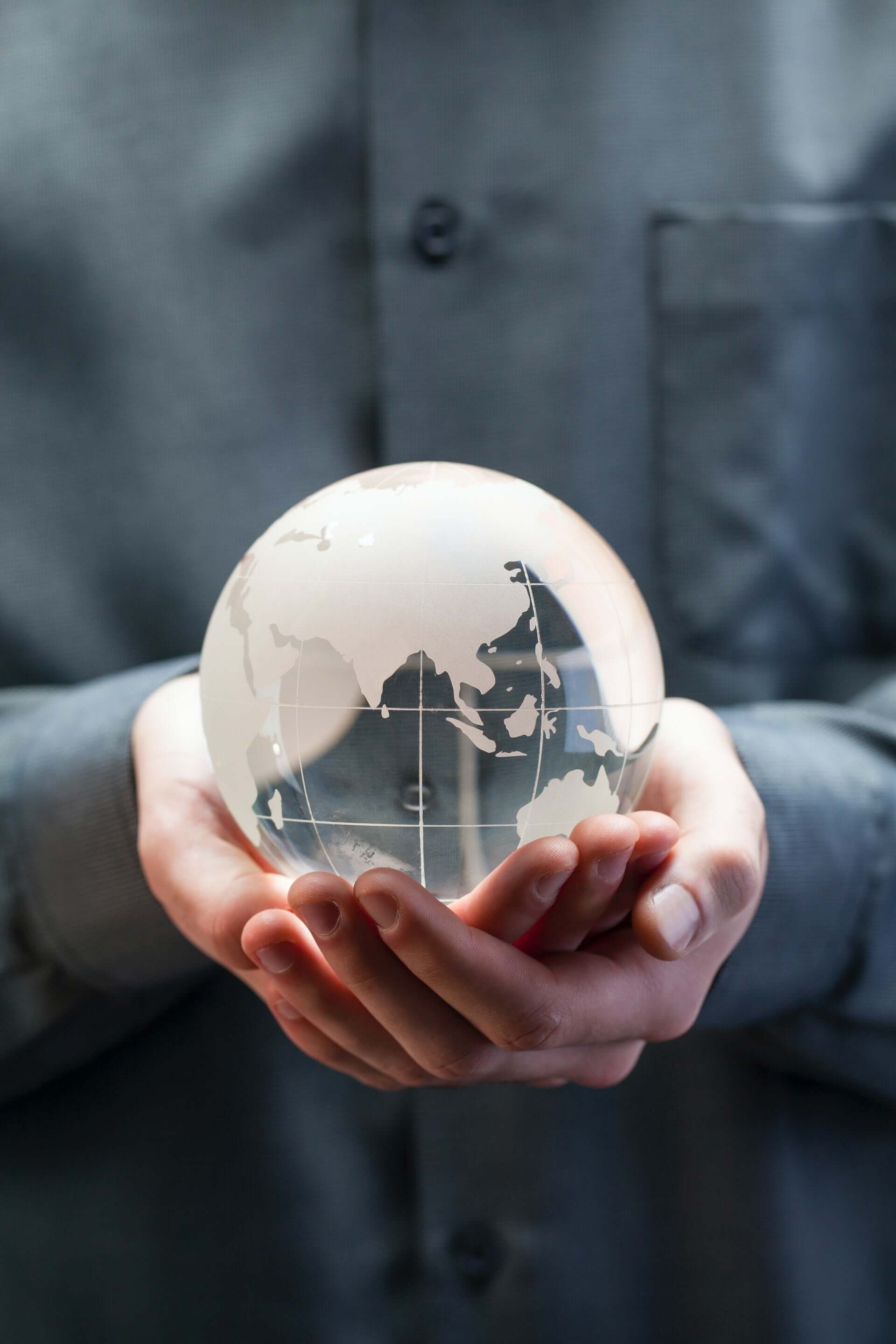
Inhaltsverzeichnis
"Wir sind das Klima” – 3 Dinge, die ich gelernt habe
Das Buch “Wir sind das Klima” von Jonathan Safran Foer erschien Ende 2019 und ist seitdem in aller Munde. Mich persönlich hat das Buch sehr berührt. Aber anstatt eine konventionelle Rezension zu verfassen, möchte ich hier drei Dinge teilen, die mich das Buch gelehrt hat – Über Kommunikation, Veränderungswillen und die Komplexität unseres Verstandes.
Über das Buch
Jonathan Safran Foer schafft es mit seinem Buch “Wir sind das Klima” (ISBN: 978-3-462-05321-0), ein so komplexes Thema wie den Klimawandel herunterzubrechen, ohne dabei lediglich Fakten aneinander zu reihen. Er nähert sich dem Thema über persönliche Geschichten und historische Anekdoten. Dadurch schafft er es, Leser und Leserinnen zu fesseln, ohne dass diese sich angeklagt fühlen. Sein Lösungsvorschlag, nur einmal am Tag (zur Hauptmahlzeit) tierische Produkte zu verzehren, ist konkret, umsetzbar und verlangt niemandem zu viel ab – und ist dennoch ausgesprochen wirkungsvoll.
Das Buch ist außerdem als Hörbuch erschienen, Christoph Maria Herbst erzählt.
Über meine Begegnung mit dem Buch
Im Herbst letzten Jahres erzählte mir eine Freundin ganz begeistert von einem neuen Hörbuch, das sie gerade hörte. Es hieße “Wir sind das Klima” von Jonathan Safran Foer. Der Name des Autors sagte mir einiges. Als Jugendliche hatte ich den Roman “Extrem laut und unglaublich nah” verschlungen und war begeistert von Foers Schreibstil gewesen. Auch sein Buch “Tiere essen” aus dem Jahre 2009 hat meine Sicht auf die Dinge nachhaltig verändert. Daher war ich sofort angefixt, als meine Freundin mir dessen neuestes Buch empfahl. Ich entschied mich, das Buch zunächst als Hörbuch zu hören, weil es für mich kostenlos auf Apple Music verfügbar war. Das Buch kam überall mit hin, auf Busfahrten, Spaziergänge, Bahnfahrten und auf die Wege zur Uni und zurück. Meiner Meinung nach passt Christoph Maria Herbst als Erzählerstimme hervorragend, das Hörbuch kann ich also nur empfehlen. Weil ich aber im Nachhinein doch merkte, dass ich einige Ausschnitte und Fakten gerne nochmal nachlesen wollte, legte ich mir das Buch auch in der haptischen Version zu.
Über die Dinge, die ich gelernt habe
1. Etwas für die Umwelt zu tun fällt uns so schwer, weil wir den Klimawandel nicht richtig begreifen können
Recht zu Beginn des Buchs versucht Foer auf der Frage auf den Grund zu gehen, wieso sich scheinbar so wenige Menschen für die aktuelle Situation, in der unsere Erde steckt, interessieren. Ein Grund ist die Thematik an sich: Das Wetter ist langweilig. Kein Thema, zu dem sich Menschen gerne stundenlange Dokumentationen, Artikel oder Berichte anschauen. Hinzu kommt, dass der Klimawandel so wenig greifbar ist. Die Auswirkungen der Klimakrise bekommen wir erst nach und nach zu spüren. In vielen Bereichen tangieren sie uns sogar gar nicht, weil wir in einer privilegierten westlichen Welt leben, in der Ressourcen “endlos” verfügbar zu sein scheinen.
Dann wäre da noch Verantwortungsgefühl des Menschen: “Ich alleine kann doch eh keinen Unterschied machen”, “Da ist die Politik für zuständig”, “Mir geht es doch gut, wieso sollte ich etwas ändern?”, “Ich habe mein ganzes Leben so gelebt, ich kann nicht plötzlich meine Gewohnheiten ändern”, “Die Generation vor mir ist Schuld”, “Die neue Generation ist Schuld”...
All diese Dinge tragen dazu bei, dass sich die Menschen dem Klimawandel nicht ausreichend widmen (wollen – können?). Glücklicherweise gibt es einzelne Menschen, die sich intensiv mit dem Thema auseinandersetzen und andere Menschen animieren wollen, mehr oder gar überhaupt etwas für unsere Umwelt zu tun. Im Allgemeinen ist der Mensch aber eher ein Gewohnheitstier, ein Faultier.
Durch die Auseinandersetzung mit der Frage, wieso die meisten Menschen so schwer für die Rettung des Klimas zu begeistern sind, habe ich ein größeres Verständnis dafür erlangt, wieso Menschen so handeln, wie sie handeln. Es hat mir aufgezeigt, wie komplex der menschliche Verstand ist und wie wichtig es ist, mit unterschiedlichen Ansätzen auf Menschen zuzugehen. Denn ein Weg ist nicht immer der richtige Weg. Damit die Menschen begreifen, was der Klimawandel wirklich ist und dass er wirklich existiert, bedarf es Geduld Kreativität & ein gewisses Maß an Nachsicht.
2. Der Mensch braucht konkrete Anweisungen
Menschen sind sich, öfters als man annehmen würde, ihrer eigenen Scheinheiligkeit bewusst. Das Problem ist, dass widersprüchliche Gedanken und Handlungen, die im Gegensatz zu den inneren Überzeugungen stehen, zu kognitiven Dissonanzen führen. Um diese entstandenen inneren Widersprüche aufzulösen, hat der Mensch zwei Möglichkeiten: Das eigene Verhalten zu verändern, oder die eigentliche Überzeugung anders zu bewerten. Weil es aufwändiger ist, Verhaltensweisen und Gewohnheiten zu ändern, neigt der Mensch dazu, die eigenen Gedanken und Überzeugungen zu verändern. Ansichten werden verargumentiert, heruntergespielt oder gar verdrängt. Das resultiert in Aussagen wie die im ersten Punkt genannten. So kommt man gut drum herum, wirklich etwas zu ändern oder das eigene Verhalten anzupassen.
Was jedoch helfen kann, ist konkrete Handlungsimpulse zu geben. Viele Menschen wünschen sich (auch in anderen Bereichen des Lebens) eine Schritt-für-Schritt-Anleitung. Die zu bekommen, ist in den meisten Fällen nicht möglich, so schön die Vorstellung auch wäre :D . Aber wenn es dann doch konkrete Dinge gibt, die man schrittweise in den eigenen Alltag implementieren kann, dann sind viele Menschen gar nicht so abgeneigt, ihr Verhalten zu ändern. Wichtig ist dabei, dass der Mensch sich nicht gleich überfordert fühlt und das Gefühl vermittelt bekommt, dass jede noch so kleine Veränderung ein Schritt in die richtige Richtung ist.
Das tut in gewisser Weise auch Foer in seinem Buch. Er appelliert daran, tierische Produkte zumindest beim Frühstück weg zu lassen. Dennoch gibt auch er zu, ab und an mal einen Burger zu essen oder andere tierische Produkte zu sich zu nehmen. Wichtig sei eben, ein Grundverständnis bzw. ein Bewusstsein für die Klimaproblematik zu entwickeln. Jedes Stück Fleisch, das nicht gekauft wird, jedes Mal, das das Auto stehen gelassen wird, jeder Flug weniger ist ein Beitrag zum Umweltschutz und hat einen Wert an sich.
3. Fakten & Zahlen vergisst man – Geschichten bleiben im Kopf
Zahlen und Fakten rund um den Klimawandel oder um die Gefahren der Massentierhaltung erstaunen mich immer wieder aufs Neue, wenn ich sie höre. Wenig später sind sie aber meist leider schon wieder vergessen. Auch wenn ich manchmal das Gefühl habe, ich sei die einzige, die diese Dinge vergisst, weiß ich, dass dem nicht so ist. Denn wir Menschen können uns ganz allgemein Dinge besser merken, wenn sie mit einer Emotion verknüpft sind. Und genau da liegt das Problem bei trockenen Zahlen und Fakten. Neben Emotionen sind auch Bilder wichtig für unser Gehirn. Der Satz “Pro Minute werden 30 Fußballfelder Regenwald abgeholzt” ist viel eingängiger für uns als die Darstellung der Größe an sich (214 200 qm).
Nach dem Hören bzw. Lesen von Foers Buch “Wir sind das Klima” ist mir aufgefallen, dass in meinem Kopf vor allem Geschichten, Gespräche und Anekdoten aus der Menschheitsgeschichte hängen geblieben sind. Wie bereits oben erwähnt, habe ich mir das Buch extra noch gekauft, um gewisse Fakten und Zahlen nachlesen zu können. Denn die habe ich eben nicht behalten.
Wir sollten uns also merken, dass wir gerne in Bildern und Emotionen sprechen können, wenn wir mit anderen Menschen kommunizieren. Wenn wir wollen, dass etwas hängen bleibt. Wenn wir andere Menschen bewegen wollen. Natürlich gehört noch viel mehr dazu, wenn man Menschen von etwas überzeugen oder sie mitreißen möchte. Und auch die Unterbringung von Fakten und Zahlen ist wichtig, nicht nur für die eigene Glaubhaftigkeit. Aber Geschichten und andere Erzählungen sind ein guter Anfang, um Aufmerksamkeit, Empathie und Interesse zu wecken.
Auch wenn “Wir sind das Klima” für mich persönlich nicht an “Tiere essen” herankommt: Das Buch hat mich eine ganze Reihe von Dingen gelehrt, insgesamt meinen Horizont in Bezug auf das Klima und die aktuelle Klimaproblematik geweitet und mir einmal mehr die Komplexität des menschlichen Verstandes aufgezeigt.
Wenn du noch mehr über Achtsamkeit, gesunde Ernährung, Nachhaltigkeit oder Familie und Schwangerschaft erfahren möchtest, schaue dir hier noch mehr spannende Blog-Artikel zu diesen Themen an.




























Leave a comment
This site is protected by hCaptcha and the hCaptcha Privacy Policy and Terms of Service apply.